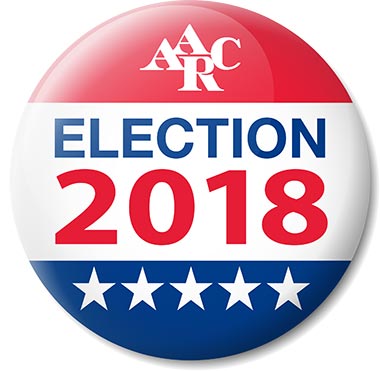President-Elect
Lynda Goodfellow, EdD, RRT, FAARC
Professor and Associate Dean for Academic Affairs
Georgia State University
Atlanta, GA
AARC Member Since: 1980
AARC Activities:
- Vice-President of Internal Affairs, 2015–2016
- Director-at-Large, 2012–2014
- Chair, Taskforce on Competencies for Entry into Respiratory Therapy Practice, 2016
- Chair, Ad Hoc Research Committee, 2016 to present
- Co-Chair, Ad Hoc Committee on 2015 and Beyond, 2011–2014
- Member, Ad Hoc Committee on Advanced RT Practices, Credentialing, and Education, 2016–present
- Chair, Education Section, 2009–2011
- Chair-Elect, Education Section, 2008
- Member, Education Section, 1995 to present
HOD Activities:
- Delegate, Georgia Society for Respiratory Care, 1990–1991
- Alternate Delegate, Georgia Society for Respiratory Care, 1988–1989
- Chair, Scrutinizing Committee, 1992
Affiliate Activities:
- Past-President, Georgia Society for Respiratory Care, 1994
- President, Georgia Society for Respiratory Care, 1993
- President-Elect, Georgia Society for Respiratory Care, 1992
- Secretary, Georgia Society for Respiratory Care, 1986–1987
- Legislative Committee Chair, Georgia Society for Respiratory Care, 1995–2004
- Chair, Nominations Committee, Georgia Society for Respiratory Care, 1994
- Member, PACT, 2002–2004, 2016
- Member, Budget Committee, Georgia Society for Respiratory Care, 1992–1994
- Member, Audit Committee, Georgia Society for Respiratory Care, 1992–1994
- Member, Program Committee, Georgia Society for Respiratory Care, 1984–1985
Related Organizations:
- Director, National Asthma Education Certification Board (NAECB), 2014–2016
- Member, Association of Asthma Educators, 2004–present
- Associate Member, Georgia Thoracic Society (now Southeast Thoracic Association), 2000–present
- Certified Basic Life Support Instructor, American Heart Association, 1986-1994, 2005–2011
- Advanced Cardiac Life Support Instructor, American Heart Association, 1990–2007
Education:
- BS, Respiratory Therapy, Medical College of Georgia, 1982
- MBA, Kennesaw State College, 1989
- EdD Adult Education, University of Georgia, 1999
- RRT #18675, National Board for Respiratory Care
- AE-C #317, National Asthma Education Certification Board
- RCP #321, Composite State Board of Medical Examiners of Georgia
Publications (for 2016 only):
- Culbreath RR, Goodfellow LT. (2016) ECMO and prone positioning in respiratory failure: a systematic literature review. Respiratory Care, 61(2):249-254. (Refereed)
- Goodfellow LT. Forward – Equipment for Respiratory Care by Teresa Volsko, Robert Chatburn, and Mohamad El-Khatib. Jones & Bartlett Learning. 2016 ISBN: 978-1-4496-5283-8.
- Gardenhire DG, Goodfellow LT. (2016) “Selected Agents of Pulmonary Value” in Rau’s Respiratory Care Pharmacology, 9th edition, by Douglas Gardenhire, Elsevier Publisher. ISBN: 978-0-323-29968-8
- Goodfellow LT. (2016) “Professional Organizations” in Respiratory Care Principles and Practice by Dean Hess, Neil MacIntyre, Shelley Mishoe, Bill Galvin, and Alex Adams, 3rd ed. Jones and Bartlett Learning Publisher, ISBN: 978-1-284-050000-4.
- Goodfellow LT. Promotion of a Teacher-Scholar Academy: Mentoring Teacher Scholars to Foster Innovation and Scholarship in the Health Professions. J Allied Health, Winter 2016, 45(4):304-305.
- Miller, LS, Goodfellow LT, Caley SD. Knowledge of Asthma and the Utilization of Certified Asthma Educators in a Health Law Partnership Legal Services Clinic. Respiratory Care 2016; 61(10):OF50.
Elections Committee Questions:
What AARC or Chartered Affiliate offices/positions have you held where you feel you made a significant contribution to our profession? What is the contribution and how will you apply it to your new position, if elected?
I was fortunate to be president of the Georgia Society for Respiratory Care (GSRC) in 1993, the year that state licensure (Georgia HB 491) became law. I recall the consensus and networking skills that GSRC members exemplified during this process, which clearly changed the practice of respiratory care in Georgia. Since 2008, my involvement with the AARC on the 2015 and Beyond conferences and subsequent committees are equally significant. Respiratory therapists with bachelor’s degrees are essential for a well-prepared workforce capable of meeting the demands of health care and patient safety. As chair of the Taskforce on Competencies for Entry into Respiratory Therapy Practice, we found that, of the 202 competencies reviewed, 153 competencies must be proficient upon entry to professional practice and 49 competencies after entry. These two experiences will direct me as I promote the unbelievable talent of respiratory therapists and the right of our patients to receive safe and quality respiratory care.
What experience would you bring to the AARC to accomplish the goals set out by President Walsh?
The goals related to safety, quality and value, and the development of an Advanced Practice Respiratory Therapist pathway are imperative. I will leverage my experience as an educator and from my efforts with the 2015 and Beyond initiative, to advocate for the continued growth, development and recognition of our workforce. I am very hopeful for our future. However, I see and hear of marginalized respiratory therapists who are unappreciated by their organizations. In addition, there are often no growth or advancement opportunities and this leads to burnout, apathy, and unsafe practice. Therefore, my passion is to elevate our educational requirements to the bachelor’s degree and to assist state societies with the implementation of the RRT as entry to the profession. The longer we wait, the greater the marginalization. The best pathway to enhancing quality of care, differentiating the role of the respiratory therapist, and for ensuring patient safety in all practice locations is education.
What ideas do you have to attract non-members to join the AARC?
I appreciate my AARC membership for many reasons, not the least of which is belonging to a group of professionals with like-minded values. However for some, “AARC non-member” is what they seem to prefer. I have often wondered, “Why?” Perhaps we have failed to demonstrate that being a non-member is not good for their career and leads to a lack of opportunity. There is evidence for this as one nursing study found that the only variable that rated statistically significantly higher by current members as compared to former members was “improvement of my work.” (J Perianesth Nurs 2003; 18(1):8-17). We as individual members cannot just rely on the AARC executive office to recruit new members. Each of us as members must speak to our colleagues, staff, and students about their membership. We, above all else, must model the professionalism and involvement that being a member of the AARC requires.
Role-Specific Questions:
How would you, as AARC President, work to move the profession forward based on the work done by our current and previous presidents?
I have a long-sustained history of active participation at the state level, as a specialty section member, as director-at-large, and as vice-president of internal affairs. Therefore, I am very familiar with the direction mapped by the current and previous presidents, going back to Dr. Toni Rodriguez’ tenure in 2008. Their leadership skills have proven to move the profession forward. I will be able to move the profession forward by working with the board of directors, our membership, and with other organizations to advance the value and worth of all respiratory therapists who are the “airway expert” to the patients we serve.
Minimum Requirements:
I am an active member of the AARC. I have served as president of my state affiliate and also as an alternate delegate, delegate, section chair, director-at-large, and vice-president for internal affairs for the BOD. My employer continues to be supportive of my involvement and I am able to fulfill the obligations and time commitments for this office in a timely manner. I will uphold the mission and policies of the Association and will reflect a positive professional image for the Association.
Preferred Characteristics:
I have board experience at the state and national level, not just for the AARC, but also for the National Asthma Educator Certification Board. I have strategic and long-range planning experience and management. As a tenured professor, I have managed multiple faculty over six distinct professions in my college. As associate dean, I have an overview of the Lewis School of Nursing and Health Professions as the Dean’s proxy and I am able to lead and manage in a variety of business and information situations.







